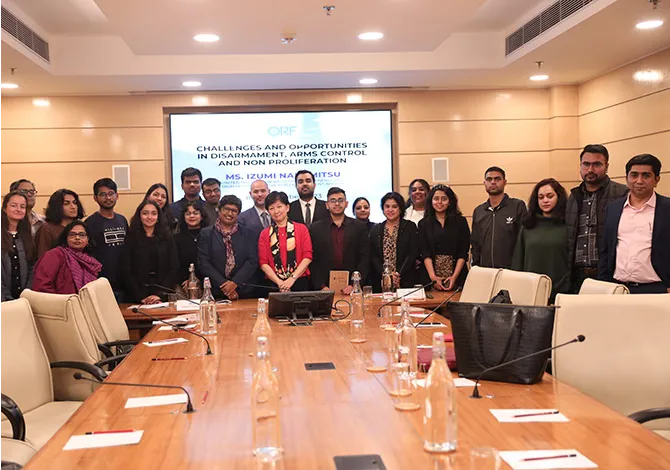Roundtable with Ms. Izumi Nakamitsu, UN Under-Secretary-General and High Representative for Disarmament Affairs
The world today is plagued by an influx of new military uses of emerging technologies and the reemergence of old conflicts, and disarmament seems to have taken a back seat. The present multipolar world order has led to the erosion of existing disarmament agreements at a time when the international community is struggling to keep pace with technological advancements. Artificial intelligence (AI) and cybersecurity have become central issues in international security. There is a dire need for stocktaking to anticipate unknown risks and develop guardrails and norms for the responsible use of existing and emerging technology.
Against the backdrop of an international security environment unfavourable to disarmament, and a global context fraught with heightened geopolitical tensions, Observer Research Foundation organised a roundtable with the United Nations (UN) Under-Secretary-General and High Representative for Disarmament Affairs, Ms. Izumi Nakamitsu, on December 8, 2023. This discussion was based on Chatham House rules and structured in an intervention-discussion format. Security and technology professionals based in New Delhi across the gamut of government(s), industry, academia and civil society were in attendance.
The discussion opened by acknowledging that modern disarmament efforts are facing multifaceted challenges. The role of middle powers in forming coalitions to infuse new energy into disarmament initiatives was underscored as a potential pathway to overcoming these challenges. The discussion then delved into the instability of the mutually assured destruction theory and advocated for disarmament, non-proliferation, and arms control as more viable security instruments.
Recent developments around the regulation of new technologies in military use were also discussed. This included the exploring the two-tier approach that has emerged out of the Convention on Certain Conventional Weapons’ Group of Governmental Experts on Lethal Autonomous Weapon Systems (LAWS). This two tier approach advocates for banning fully autonomous LAWS (which can decide on and engage targets without any human intervention), and regulating partially autonomous LAWS. Cyber and space were two other critical areas that were brought up, in particular the regulatory efforts at the Open Ended Working Groups (OEWGs) around them, and the proposal for a separate process for a legally binding framework for space security and sustainability.
It was noted that the Secretary General’s New Agenda for Peace addresses many of these contemporary disarmament challenges, while also linking them with diplomacy and counter terrorism. The roundtable also emphasised the importance of national strategies for the responsible development and deployment of dual-use technologies, alongside effective governance mechanisms. More substantive discussions are warranted for the intensification of threats when technologies are combined, such as the convergence of AI and nuclear tech, and for emerging technologies that blur the lines of conventional technologies, such as hypersonic weapons. To this end, it is important for States to convene non-political, technical dialogues to establish international definitions and mobilise political will for norm-building.
Humanitarian considerations and international humanitarian law were also highlighted as vital components of the disarmament conversation. A human-centric approach is essential, particularly in a world where military expenditures are continually rising. This perspective brings into focus the broader implications of disarmament, and their contribution to the Sustainable Development Goals (SDGs). A related point of consensus was the importance of diverse representation in disarmament apparatuses, with support for shifting disarmament dialogues to places like Asia, Latin America, and Africa, and stronger protocols to ensure gender balance and adequate representation of women.
While both multilateral and minilateral conversations continue to be relevant, it was recommended that the UN also adopt a ‘networked multilateralism’ approach. This would involve stakeholders outside the government in norm-making, while the UN acts as a facilitator that streamlines and connects regional norms, and ensures that the aggregate at the global level complements these. This is especially relevant as one of the most important factors for disarmament today is countries and communities understanding the risks and consequences of the technologies they are developing and acting responsibly based on that knowledge.
Experts also pointed out the gaps in existing international law. While Article 51 of the United Nations Charter protects the inherent right to self-defence, it is unclear where the law stands on whether kinetic force can be used in retaliation to a cyber attack that does not use kinetic force, but paralyses the basic functioning of a state. Similarly, it is unclear how non-state actors engaging in cyberwarfare in the name of their country should be dealt with. The question on whether we need new principles for cyberwarfare remains open. However, the geopolitical and international environment is presently so deeply fragmented that creating legally binding treaties would be unrealistic. Instead, we need new approaches to rule-making that include soft power and soft laws.
While it appears that the world is in a constant arms race, now bolstered by new technologies, it is helpful to remember that key disarmament agreements were made at the height of global tensions. At a time when traditional arms control methods are at a stalemate, the UN’s Office for Disarmament Affairs continues to explore holistic and inclusive approaches for disarmament, like the inclusion of industry, grassroots organisations and civil society. This is our opportunity, as a global community, to create effective disarmament strategies that can respond to the rapidly evolving technological and geopolitical landscape.
This event report is written by Shimona Mohan, Junior Fellow in the Centre for Security, Strategy and Technology (CSST), Observer Research Foundation; Amoha Basrur, Research Assistant, Centre for Security, Strategy and Technology, Observer Research Foundation.
The views expressed above belong to the author(s). ORF research and analyses now available on Telegram! Click here to access our curated content — blogs, longforms and interviews.




 PREV
PREV

